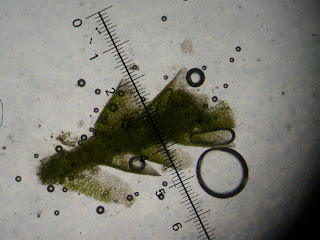We only recorded a few additional bryophytes for the site, but one of them was rather exciting. I have never seen a Gymnomitium south of Ceredigion, but there on one rock face were three small tufts and a few scattered patches of what looked to be G. obtusum, which if Sam agrees, it will be new to our south Wales counties. The pics below show the tightly appressed overlapping leaves of this tiny liverwort, which has a silvery appearance when dry. Most leaf tips of this specimen appear to be blunt, which seem to point to it being obtusum rather than concinnatum.
Much of the focus of our visit was on the vascular plants. I knew that Silene maritima was present at Craig Fan Ddu, but I hadn't realised just how frequent it is and this species really makes it stand out from other crags in the Brecon Beacons. A few other crag specialists including Thalictrum minus and Sedum rosea are present, but they are scarce here compared to other crags in the central and western Beacons. Towards the end of our visit we turned a corner and were amazed to see several plants of Salix herbacea, a species I have always wanted to see in the National Park. Overall we counted about 20 plants, about half of them tucked away amongst heathy vegetation growing along the top edge of the crags and easily overlooked.
The following day we checked previous Salix herbacea records for the Pen-y-Fan/ central Breacons area - to cut a long story short, the local record centre/ NBN data gives the impression that there are quite a few records for the area, however most of this is noise resulting from species compilations and centroid grid references and the only real records seem to be a 1972 record from Craig Fan Ddu and possibly the same location as ours, an unlocalised 1888 record by Ley and a 1952 record from Craig Cwm Sere, which the local BSBI Recorder is following up. Leafminers had been at work on some Salix plants and a couple were also infected by what I hope is the fungus Melampsora arctica.






Gymnomitrion obtusum is a really exciting addition to the Beacons bryoflora because it is so northern in Britain. The only commonish member of the genus in our area is G crenulatum, which is widely scattered in Preseli and has one known site in NE Carms. I remember finding G obtusum in Ceredigion, new for the VC I think. The only G concinnatum was one of my last few discoveries in Pembs in 2010. Both obtusum and crenulatum are pretty common in N Wales though.
ReplyDeleteIt is good to find another of those bryophytes that have records in north Wales and SW England, but seemingly absent from south Wales. Someone needs to find Adelanthus next!
ReplyDeleteGymnomitium and Salix herbacea - what a fantastic couple of finds!
ReplyDeleteThat is a great record Graham.
ReplyDeleteI always enjoy seeing new species being added to the blog, so well done adding two!
ReplyDelete